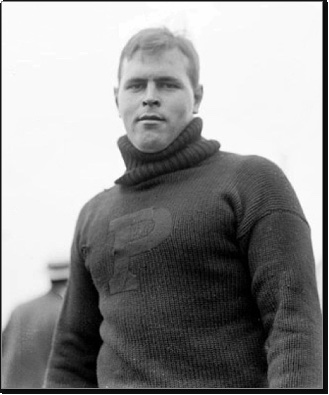
Sports: Football & Track and Field
Born: October 29, 1881
Died: July 28, 1930
Town: Phillipsburg, New Jersey
John Riegel DeWitt was born on October 29, 1881 in Phillipsburg, NJ to Ella and Silas DeWitt. His mother was the descendant of the Riegels, a prominent landowning family in Pennsylvania’s Lehigh Valley. John spent much of his boyhood there, in Riegelsville. He was a broad-shouldered, athletic young man with tremendous upper-body strength. He developed his intellectual and athletic skills at Lawrenceville Prep, where he starred for the football team.
John was accepted at Princeton in 1900 but had to sit out his first football season because of a hand injury. In the spring of 1901, he turned his attention to the discus and hammer throw. John was the top collegian in the hammer throw as a freshman, and defended his title all four years he competed for the track team. In 1902, he set a world record with a throw of 168’ 7” in a dramatic head-to-head battle with John Flanagan, the reigning Olympic champion.
John became a standout on the gridiron for the Tigers in the fall of 1901. At 6’1” and 200 pounds, he was a dominant blocker and tackler, and also handled drop-kicking duties for a team that started the year 8–0 before a tie with Army and a season-ending loss to Yale. In an October game against Lafayette that year, coach Langdon Lea pulled John off the line and inserted him in the backfield. He took a handoff and blasted through the line for a 75-yard touchdown that turned a scoreless tie into a 6–0 victory.
In 1902, Princeton started the year 8–0 again, but lost the season finale to Yale. John was named a first-team All-American by Walter Camp at guard and was hailed as one of the nation’s top kickers.
In 1903, John became team captain and Princeton went undefeated. The Tigers claimed the national title with a road win over Yale in November. Trailing 6–0, Princeton blocked a Yale field goal attempt and John reportedly caught the ball in the air. He galloped 70 yards into the end zone and kicked the game-tying extra point (touchdowns and field goals both counted for 5 points in 1903). With time running out in the fourth quarter, John kicked a 53-yard field goal to win the game, 11–6. Yale’s touchdown accounted for the only points Princeton allowed that season; the powerhouse Eli offense had scored 295 points heading into the Princeton game.
John earned first-team All-America honors again, and was widely regarded as the nation’s best all-around football player. Camp later named him to his all-time team. The Tigers were 28–2–1 during John’s three varsity seasons. His athletic career concluded in the summer of 1904 at the Olympics in St. Louis. On his first hammer throw, he reached 164’ 11”. Flanagan bested him with a throw of 168’ 1” to win the gold medal. John settled for silver.
John entered the business world and enjoyed great success in the ’teens and ’twenties. He moved to Connecticut and was named president of the National Bag Corp. in New York. In 1930, at the age of 48, John suffered a fatal heart attack on a commuter train headed into the city. He and his wife were on their way to meet with a cardiologist. In 1954, John was enshrined in the College Football Hall of Fame.